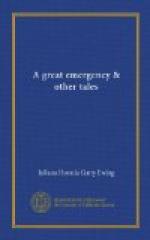She was pondering this when Jemima burst in in her cooking apron, followed up the passage by the steam of Christmas cakes, and carrying a letter.
“It’s a big one, Miss,” said she. “Perhaps it’s a Christmas-box, Miss.” And beaming with geniality and kitchen warmth, Jemima returned to her labours.
Madam Liberality made up her mind about the dresses and aprons; then she opened her letter.
It announced the death of her cousin, her godmother’s husband. It announced also that, in spite of the closest search for a will, which he was supposed to have made, this could not be found.
Possibly he had destroyed it, intending to make another. As it was he had died intestate, and succession not being limited to heirs male, and Madam Liberality being the eldest child of his nearest relative—the old childish feeling of its being a dream came over her.
She pinched herself, however, to no purpose. There lay the letter, and after a second reading Madam Liberality picked up the thread of the narrative and arrived at the result—she had inherited fifteen thousand a year.
The first rational idea which came to her was that there was no difficulty now about getting the curtains; and the second was that their chief merit was a merit no more. What is the good of a thing being cheap when one has fifteen thousand a year?
Madam Liberality poked the fire extravagantly, and sat down to think.
The curtains naturally led her to household questions, and those to that invaluable person, Jemima. That Jemima’s wages should be doubled, trebled, quadrupled, was a thing of course. What post she was to fill in the new circumstances was another matter. Remembering Podmore, and recalling the fatigue of dressing herself after her pretty numerous illnesses. Madam Liberality felt that a lady’s-maid would be a comfort to be most thankful for. But she could not fancy Jemima in that capacity, or as a housekeeper, or even as head housemaid or cook. She had lived for years with Jemima herself, but she could not fit her into a suitable place in the servants’ hall.
However, with fifteen thousand a year, Madam Liberality could buy, if needful, a field, and build a house, and put Jemima into it with a servant to wait upon her. The really important question was about her new domestics. Sixteen servants are a heavy responsibility.
Madam Liberality had very high ideas of the parental duties involved in being the head of a household. She had suffered—more than Jemima—over Jemima’s lack of scruple as to telling lies for good purposes. Now a footman is a young man who has, no doubt, his own peculiar temptations. What check could Madam Liberality keep upon him? Possibly she might—under the strong pressure of moral responsibility—give good general advice to the footman; but the idea of the butler troubled her.
When one has lived alone in a little house for many years one gets timid. She put a case to herself. Say that she knew the butler to be in the habit of stealing the wine, and suspected the gardener of making a good income by the best of the wall fruit, would she have the moral courage to be as firm with these important personages as if she had caught one of the school-children picking and stealing in the orchard? And if not, would not family prayers be a mockery?




